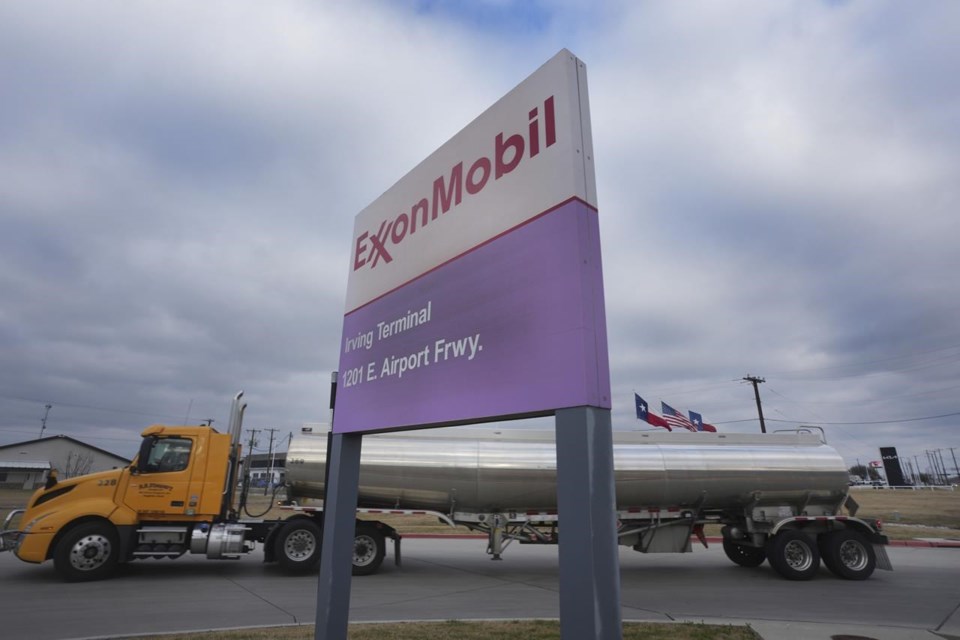VANCOUVER — Environmental groups are celebrating after ExxonMobil relinquished offshore oil and gas exploration permits in British Columbia dating back more than 50 years.
Lawyer Ian Miron with Ecojustice Canada said the company had been dropped from a Federal Court lawsuit filed by the David Suzuki Foundation and World Wildlife Fund Canada last year challenging the Canadian government's continual renewal of the permits.
Miron, who represents the two groups, said the permits formerly held by Exxon covered "really environmentally significant areas" off the B.C. coast.
ExxonMobil spokeswoman Margot Bruce-O’Connell confirmed the company gave up nine permits it held in B.C. but refused to comment further.
Miron said the groups' legal challenge remains active against Chevron Canada, which also holds long-standing permits in the province.
He said a "policy-based moratorium" prohibits oil and gas exploration in marine protected areas off the B.C. coast, but it's not legally binding and the existence of the permits undermines environmental protection and conservation efforts.
"It can be lifted at any time. It's subject to change at the whims of the government of the day," Miron said. "The concern was that the fact that these permits exist, they are impeding the full conservation of those areas, and there was a risk that they could have opened them up and gone in to drill."
Miron said the driving concern behind the court action is that a policy-based moratorium doesn't fully protect ecologically sensitive areas on the B.C. coast including Queen Charlotte Sound and the Hecate Strait.
"Drilling is a possibility at some point," he said. "These have been identified as really important, ecologically important areas and they should be fully protected, and they're not currently fully protected."
Jay Ritchlin, B.C. and western director-general for the David Suzuki Foundation, said in a statement the relinquishment by ExxonMobil "is an encouraging move."
"Oil and gas leases have no place in B.C.’s offshore. Now is the time for Chevron and other permit holders to follow suit,” Ritchlin said.
Representatives from Chevron Canada did not immediately respond to requests for comment.
In July 2022, the David Suzuki Foundation and World Wildlife Fund Canada filed an application in Federal Court claiming the minister of natural resources wrongfully extended the terms of oil and gas permits owned by the firms.
The permits fall within the Scott Islands Protected Marine Area and the Hecate Strait/Queen Charlotte Sound Glass Sponge Reefs Marine Protected Area.
The environmental groups claim in court that the indefinite extensions of the terms of those permits are unlawful and contravene the Canada Petroleum Resources Act.
“Both protected areas are of outstanding ecological value and vulnerable to damage from human impacts, including oil and gas activities,” the court application states.
The permits were originally issued in the late 1960s and early 1970s, and the framework to issue them was changed twice in 1980s.
When the rules changed, permit holders like Chevron and ExxonMobil were supposed to negotiate with the minister of natural resources to convert them into exploration licences "within a prescribed time."
"They did not do so," the environmental groups claim. "To this day, the permits have not been converted into exploration licences."
The David Suzuki Foundation and WWF Canada allege the permits should therefore be surrendered.
With ExxonMobil relinquishing its permits, the company has been dropped as a respondent from the court case, but it remains active against Chevron, the minister of natural resources and the Attorney General of Canada.
Miron says offshore oil and gas exploration in British Columbia has been an "open question for the past several decades."
He says the approval of the Bay du Nord oil project off Newfoundland last year by the federal government indicates that the B.C. coast is not immune to oil and gas activity since the current moratorium could one day be lifted.
“There is a level of discomfort with the finality of that moratorium and that concern is kind of driving the action here,” he said.
This report by The Canadian Press was first published March 10, 2023.
Darryl Greer, The Canadian Press




